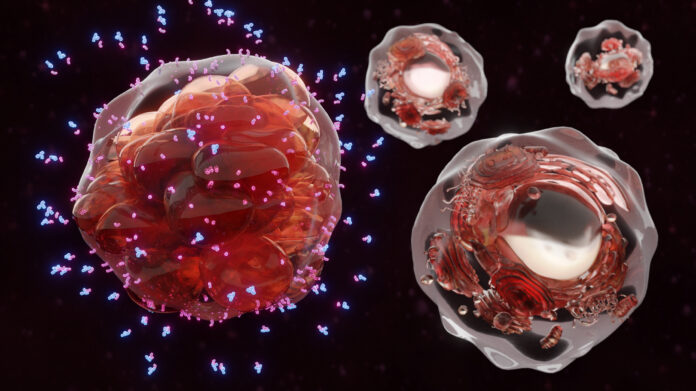
Researchers from the Sylvester Comprehensive Cancer at the University of Miami Miller School of Medicine have shown that providing a pretreatment for cancer patients can reduce the rate of cytokine release syndrome (CRS) associated with immunotherapy treatments.
The findings, published today in the journal Blood Cancer Discovery, promise to make the significant benefits of immunotherapy available to more patients for treating myeloma and other blood cancers. Currently, due to the potential of serious side effects such as CRS and immune cell-associated neurotoxicity syndrome (ICANS) that can result from immunotherapy treatments, patients are given these drug in the hospital setting over the course of five to seven days in order to receive additional drug designed to fight these side effects. But the new findings could change this treatment strategy.
“These immunotherapy drugs work by revving the immune system’s response against the tumor. But the process can lead to an overactive immune response, the hallmark of CRS,” said C. Ola Landgren, MD, chief of the Division of Myeloma at Sylvester and co-corresponding study author. “In an ideal world, you could pre-medicate patients against CRS and treat them in an outpatient setting. As a result, there is huge interest in this possibility worldwide.”
The authors pointed to the high response rates of the immunotherapy teclistamab—a bispecific T-cell engager—which showed in a clinical study published in 2022 in the New England Journal of Medicine an overall response rate of 63% in multiple myeloma patients whose tumors had failed to respond to multiple lines of prior therapies. Because teclistimab is also associated with both CRS and ICANS, oncologists often need to turn to other drugs, such as tocilizumab which has been used for years to quell CRS.
The current research from the Sylvester Comprehensive Cancer investigators was inspired by yet another 2022 study that showed pretreating patients with tocilizumab eased cytokine release syndrome in patients receiving a different bispecific T-cell engager. The Sylvester study showed that of the 31 patients who received a prophylactic dose of tocilizumab prior to teclistimab treatments, only 13% developed CRS, a significant reduction of rates reported in an earlier study of where 72% of patients experienced CRS. Further, patients in the current study experienced less severed CRS and lower rates of recurrence.
“Prophylactic treatment with tocilizumab is now standard of care at Sylvester for multiple myeloma patients receiving T-cell engagers,” said Andrew Kowalski, PharmD, a hematology/oncology clinical pharmacist at Sylvester and the study’s lead author. “We are ahead of the curve.”
The researchers noted that this preventative measure also appears to suppress ICANS, a less common side effect that causes neurotoxicity, and also can benefit from patients receiving CAR-T immunotherapy.
While these early results are encouraging, the Sylvester team will now look to answer other questions about this approach—the most important are whether the tocilizumab provided prior to immunotherapy reduces its effectiveness and whether patients with blood cancers other than multiple myeloma might also benefit. Right now, the team believes the data is encouraging on both fronts.
As a result of these findings, the Sylvester researchers have begun readying an outpatient service to deliver teclistamab as well as other immunotherapies in an outpatient setting, as their data is strong enough to suggest that the FDA may lift the hospital stay requirement for the use of these drugs.